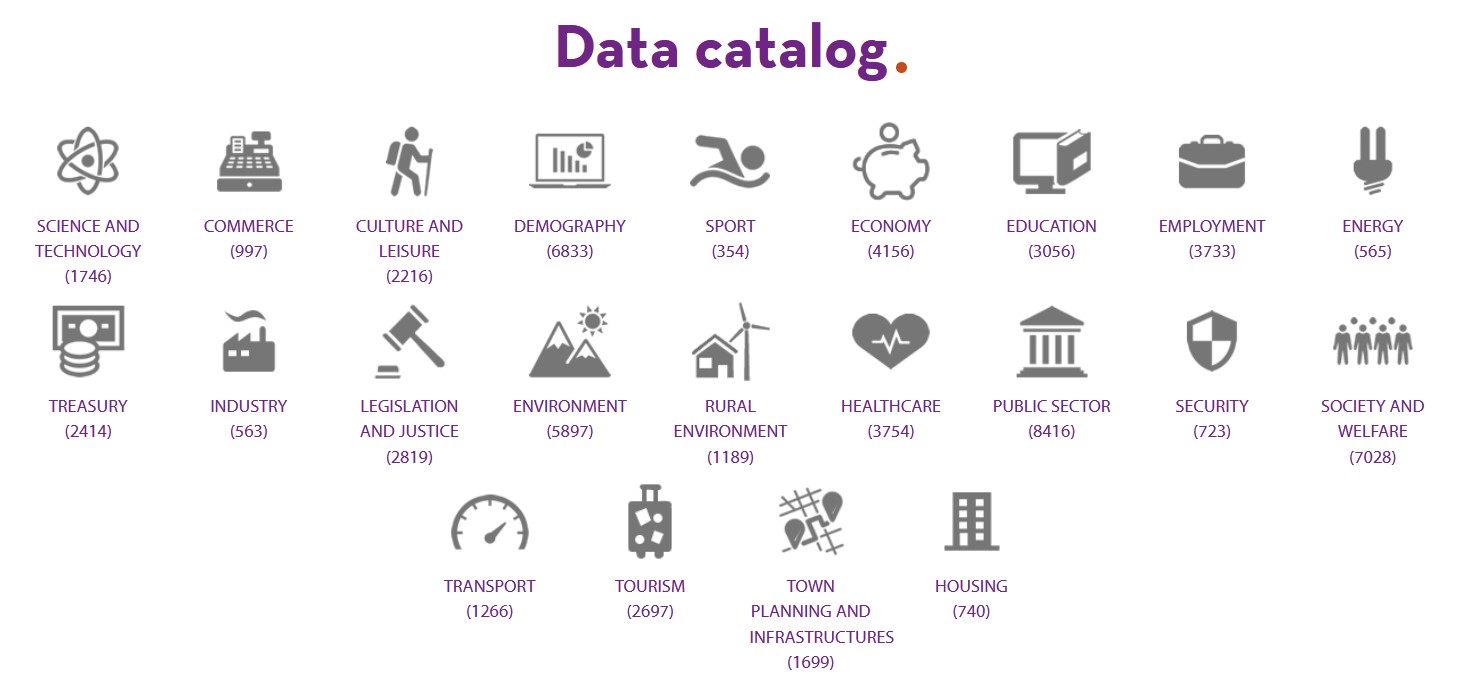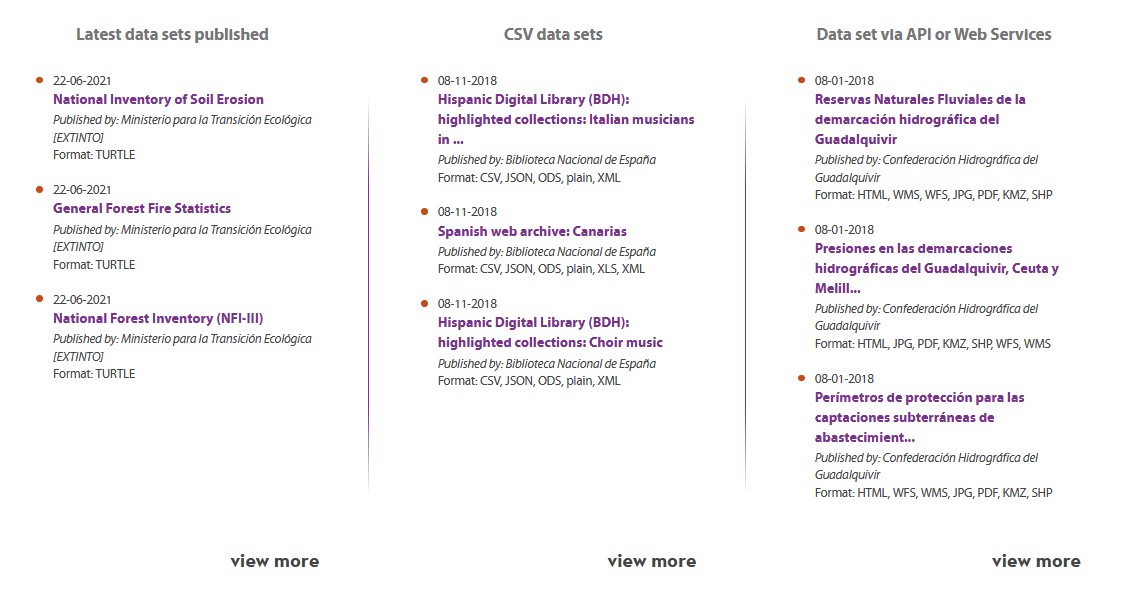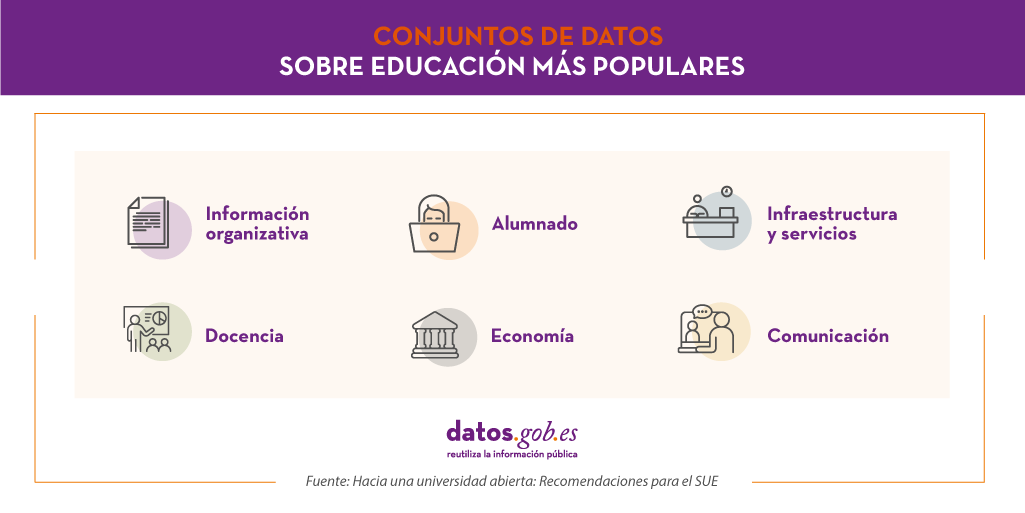Do you know the sectors of datos.gob.es?
Fecha de la noticia: 01-07-2021

A symptom of the maturity of an open data ecosystem is the possibility of finding datasets and use cases across different sectors of activity. This is considered by the European Open Data Portal itself in its maturity index. The classification of data and their uses by thematic categories boosts re-use by allowing users to locate and access them in a more targeted way. It also allows needs in specific areas to be detected, priority sectors to be identified and impact to be estimated more easily.
In Spain we find different thematic repositories, such as UniversiData, in the case of higher education, or TURESPAÑA, for the tourism sector. However, the fact that the competences of certain subjects are distributed among the Autonomous Communities or City Councils complicates the location of data on the same subject.
Datos.gob.es brings together the open data of all the Spanish public bodies that have carried out a federation process with the portal. Therefore, in our catalogue you can find datasets from different publishers segmented by 22 thematic categories, those considered by the Technical Interoperability Standard.

Number of datasets by category as of June 2021
But in addition to showing the datasets divided by subject area, it is also important to show highlighted datasets, use cases, guides and other help resources by sector, so that users can more easily access content related to their areas of interest. For this reason, at datos.gob.es we have launched a series of web sections focused on different sectors of activity, with specific content for each area.
4 sectorial sections that will be gradually extended to other areas of interest
Currently in datos.gob.es you can find 4 sectors: Environment, Culture and leisure, Education and Transport. These sectors have been highlighted for different strategic reasons:
- Environment: Environmental data are essential to understand how our environment is changing in order to fight climate change, pollution and deforestation. The European Commission itself considers environmental data to be highly valuable data in Directive 2019/1024. At datos.gob.es you can find data on air quality, weather forecasting, water scarcity, etc. All of them are essential to promote solutions for a more sustainable world.
- Transport: Directive 2019/1024 also highlights the importance of transport data. Often in real time, this data facilitates decision-making aimed at efficient service management and improving the passenger experience. Transport data are among the most widely used data to create services and applications (e.g. those that inform about traffic conditions, bus timetables, etc.). This category includes datasets such as real-time traffic incidents or fuel prices.
- Education: With the advent of COVID-19, many students had to follow their studies from home, using digital solutions that were not always ready. In recent months, through initiatives such as the Aporta Challenge, an effort has been made to promote the creation of solutions that incorporate open data in order to improve the efficiency of the educational sphere, drive improvements - such as the personalisation of education - and achieve more universal access to knowledge. Some of the education datasets that can be found in the catalogue are the degrees offered by Spanish universities or surveys on household spending on education.
- Culture and leisure: Culture and leisure data is a category of great importance when it comes to reusing it to develop, for example, educational and learning content. Cultural data can help generate new knowledge to help us understand our past, present and future. Examples of datasets are the location of monuments or listings of works of art.
Structure of each sector
Each sector page has a homogeneous structure, which facilitates the location of contents also available in other sections.
It starts with a highlight where you can see some examples of outstanding datasets belonging to this category, and a link to access all the datasets of this subject in the catalogue.
It continues with news related to the data and the sector in question, which can range from events or information on specific initiatives (such as Procomún in the field of educational data or the Green Deal in the environment) to the latest developments at strategic and operational level.
Finally, there are three sections related to use cases: innovation, reusing companies and applications. In the first section, articles provide examples of innovative uses, often linked to disruptive technologies such as Artificial Intelligence. In the last two sections, we find specific files on companies and applications that use open data from this category to generate a benefit for society or the economy.
Highlights section on the home page
In addition to the creation of sectoral pages, over the last year, datos.gob.es has also incorporated a section of highlighted datasets. The aim is to give greater visibility to those datasets that meet a series of characteristics: they have been updated, are in CSV format or can be accessed via API or web services.

What other sectors would you like to highlight?
The plans of datos.gob.es include continuing to increase the number of sectors to be highlighted. Therefore, we invite you to leave in comments any proposal you consider appropriate.













